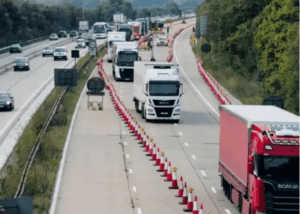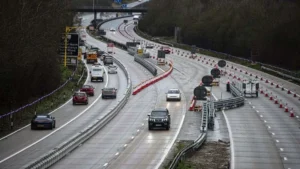Drivers are warned of significant delays as a result of ongoing disruption at the Port of Dover and Eurotunnel.
Passengers heading to Europe will find their journeys further impacted by the Operation Brock (pictured – from file) traffic management scheme being used on the M20, to manage the flow of freight heading to the continent. Operation Brock is part of a series of measures to improve Kent’s resilience in the event of disruption to services across the English Channel.
The coastbound M20 is currently closed for non-freight traffic between junctions 8 (Maidstone) and 12 (Folkestone). The M20 eastbound entry slip roads at J9, J10 and J11 are also closed to help manage traffic flows. The London-bound carriageway is fully open to all vehicles and is flowing freely. Non freight traffic is currently being diverted along the A20 to the Eurotunnel. Tourist traffic for the Port of Dover must use the A2 and M2.
All drivers planning to travel in or through Kent should plan ahead, follow diversion signs, check before they travel and leave plenty of extra time for their journey.
Freight drivers are reminded they must follow the signs and use the M20 and join Operation Brock at M20 junction 8. Any EU-bound hauliers not complying with signage and trying to jump the queue not only risk a fine of £300 but will also be sent to the back of the queue by police or enforcement agents. Since the operation began over 100 fixed penalty notices have been issued for non-compliance.
Tactical Lead for the Kent Resilience Forum, Toby Howe, said “All partners of the Kent Resilience Forum are working round the clock to try to keep traffic moving and support those living, working, visiting or passing through Kent. We’re very aware of the impacts of border disruption and currently using traffic controls are our best option for keeping the county moving as smoothly as possible.
“We thank everyone for their ongoing patience and are committed to helping everyone overcome these issues but due to the disruption being experienced at the ferry ports and Eurotunnel it is important that drivers should plan for lengthy delays and ensure passengers having ample supplies of water, food or any medicines needed. Drivers should also check vehicles before setting off to ensure there are no issues with tyres, oil or fuel.
“The KRF continues to do everything it can to get the queues reduced and people on their way. Please don’t leave your safety to chance – if you decide to travel, you must be prepared.”
(Picture – National Highways)























